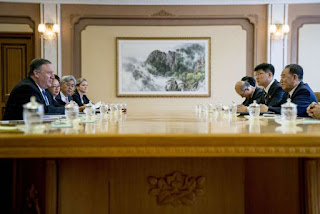If Secretary of State Mike Pompeo’s visit to North Korea on Friday and Saturday was designed to ease worries about the progress on denuclearization talks between Washington and Pyongyang, it seems to have failed.
Just hours after Pompeo left the North Korean capital and described the negotiations as “productive,” North Korea’s Foreign Ministry released a scathing statement that cast the entire endeavor in doubt.
“The U.S. side came up only with its unilateral and gangster-like demand for denuclearization,” the statement said, adding that the American attitude toward the talks had been “regrettable.”
But North Korea’s statement itself was notable for far more than just its negative tone. Running more than 1,200 words in an official English-language translation released on the state-run Korea Central News Agency, it may offer the most comprehensive signal yet of how Pyongyang views the possibility of abandoning its nuclear weapons.
This vision will not shock seasoned North Korea-watchers, who say that Pyongyang has been largely consistent on the nuclear issue over the years. But it may come as a surprise to those who heard President Trump when he said that there was “no longer a nuclear threat from North Korea” a day after he met with North Korean leader Kim Jong Un for the first time in Singapore.
Pyongyang is now emphasizing that it views the brief, 400-word agreement reached at that summit as just the very beginning of talks, not a promise to unilaterally disarm.
“They undoubtedly see this as the first stage in a phase-by-phase, step-by-step simultaneous approach leading to denuclearization,” said Joel Wit, a former State Department official who helped negotiate a 1994 nuclear agreement with North Korea.
Indeed, the wording of North Korea’s statement may also suggest that it viewed the four items in the Trump-Kim agreement as a schedule. Denuclearization was the third item on the list. The first item was to establish “new U.S.-DPRK relations,” followed by efforts to build “a lasting and stable peace regime on the Korean Peninsula.” The statement released by Pyongyang on Saturday said that the “first process of defusing tension” would be to announce an official end to the Korean War.
But the North Korean Foreign Ministry complained Saturday that Pompeo’s team had “never mentioned the issue of establishing a peace regime on the Korean peninsula” while they were in Pyongyang. Instead, the statement said, the United States had continued its calls for “CVID”: complete, verifiable and irreversible denuclearization. That term has been repeatedly used by Pompeo and other U.S. officials to describe Washington’s aims in its talks with Pyongyang, though the State Department recently began using another term in its official statements: final, fully verified denuclearization.
North Korea highlighted what it saw as a major concessions on its part — the destruction of nuclear testing site Punggye-ri in May and the planned dismantling of a test facility for intercontinental ballistic missiles that it said would mark a “physical verification” of a freeze on missile production.
Vipin Narang, an expert on weapons proliferation at Massachusetts Institute of Technology, said the latter detail was particularly notable. “They view the test site as a bigger concession than it’s getting credit for,” Narang said. He noted that regional allies like Japan may be concerned that only long-range missiles were included.
The statement also implied that these moves were greater than the United States’ suspension of joint military exercises with South Korea, which it said was “a highly reversible step which can be resumed anytime at any moment as all of its military force remains intact.”
Such comments made clear that North Korea was ultimately seeking the removal of U.S. troops from the Korean Peninsula, according to Duyeon Kim, a fellow at the Korean Peninsula Future Forum.
“The North has never seen denuclearization in a vacuum, but as part of a larger package and something that’s considered only after there is a peace regime,” said Kim. “In other words, after U.S. troops are withdrawn and U.S.-South Korean military exercises are . . . abolished.”
While the statement did leave the door open for further talks, it may be setting the tone for going forward. Bruce Klingner, a former CIA analyst and North Korea expert at the Heritage Foundation, said the statement showed that to North Korea, denuclearization of the Korean Peninsula means “global arms control in which it will abandon its arsenal when all other nuclear powers, including the United States, abandon theirs.”
The United States may not ultimately agree to North Korea’s goals, but Wit and others said that talks should continue. Suggesting that the United States needed to find a special negotiator to meet continuously with the North Koreans, Wit said that it was “a fantasy to think that this can be done overnight” but that it could be done eventually.
Right now, North Korea appears to believe so too. For all the harsh language in the Foreign Ministry’s statement on Saturday, it remained respectful of one man whose views of the negotiations are really crucial.
“We still cherish our good faith in President Trump,” the statement read.














0 comments: